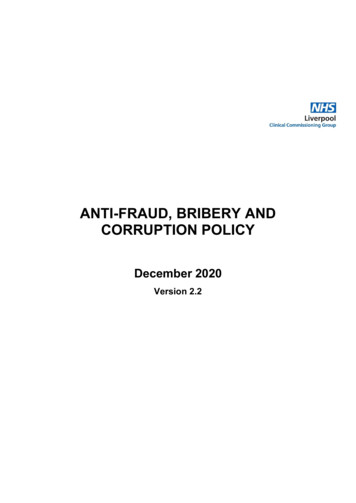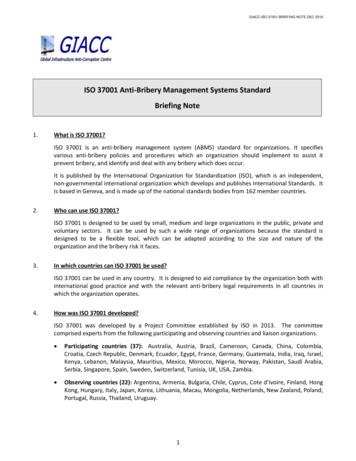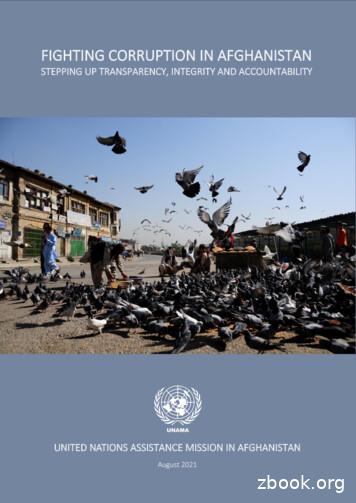ANTI-FRAUD, BRIBERY AND CORRUPTION POLICY
ANTI-FRAUD, BRIBERY ANDCORRUPTION POLICYDecember 2020Version 2.2
Version2.2Target AudienceAll Staff and stakeholdersApproved by:Audit, Risk & Scrutiny CommitteeDate approved:8th December 2020Name of originator/author:Michelle Moss – Anti-FraudSpecialist - MIAAStephen Hendry Head of CorporateServices and GovernanceName of lead:Date issued/published:December 2023Review date:Target AudienceOrganisational wide policyAny changes to this policy should be outlined and recorded in the version controltable below. In the event of any changes to relevant legislation or statutoryprocedures or duty this policy will be automatically updated to ensure compliancewithout approvals being necessary.Version nos Type of changeDateDescription of change2.1Amendment (minor)M MossPolicy updated with new NHS CounterFraud Authority (CFA) referenced inplace of NHS Protect. Minor changesto layout of policy.2.2Amendment(minor)27.11.20Update to 5.7 NHSCFA paragraphto expand further on what they do.Update to references due to linksout of date/guidance has changed.2.2Amendment27.11.202Updated paragraph 1.1 reflectNHSCFA four key principlesNew 2.2 counter fraud standardsaddedNew 5.10 Fraud Champion (newrole)New 5.11 FTSU Guardian roleNew 6.3 Disciplinary action added
New 6.4 Sanctions and RedressaddedApplicable Statutory, Legal orNational Best PracticeRequirementsAnti-Fraud and Corruption ManualPublic Interest Disclosure Act 1998NHS Standards ContractFraud Act 2006Bribery Act 2010NHS England Conflicts of Interest StatutoryGuidance 2017The CCG is committed to an environment that promotes equality, embraces diversityand respects human rights both within our workforce and in service delivery. Thisdocument should be implemented with due regard to this commitment.This document can only be considered valid when viewed via the CCG’s intranet. Ifthis document is printed into hard copy or saved to another location, you must checkthat the version number on your copy matches that of the one online.Approved documents are valid for use after their approval date and remain in forcebeyond any expiry of their review date until a new version is available.3
2.22.32.4DefinitionsNHS Counter Fraud AuthorityCounter Fraud StandardsFraudBribery and Corruption777-883Other Relevant Procedural Documents104Code of 1266.1Roles and ResponsibilitiesRole of the Governing Body / Audit CommitteeChief ExecutiveChief Finance Officer (CFO)ManagersEmployeesAnti-Fraud Specialist (AFS)NHS Counter Fraud Authority (NHSCFA)Internal and External AuditHuman ResourcesFraud ChampionFreedom to Speak Up Guardians (‘Whistleblowing’)Information Management and Technology1111-121212-1313-1414-1515 161617171717186.2566The Response PlanReporting fraud, bribery and/or corruptionSanctions and Redress1819AppendicesAppendix A – Desktop GuideAppendix B – Referral Form788.18.2Consultation ProcessDissemination and Process for Monitoring Compliance and Effectiveness2110Standards/Key Performance Indicators2111References21-224
1IntroductionOne of the basic principles of public sector organisations is the proper use of publicfunds. The majority of people who work in the NHS conduct themselves in anhonest and professional manner and they believe that fraud, bribery andcorruption, committed by a minority, is wholly unacceptable as it ultimately leads toa reduction in the resources available for patient care.Liverpool CCG (the ‘CCG’) is committed to reducing the level of fraud, bribery andcorruption within the NHS to an absolute minimum and keeping it at that level,freeing up public resources for better patient care. The CCG does not toleratefraud, bribery or corruption and aims to eliminate all such activity as far as possible.The CCG wishes to encourage anyone having reasonable suspicions of fraud,bribery or corruption to report them. For the purposes of this policy “reasonablyheld suspicions” shall mean any suspicions other than those which are totallygroundless (and/or raised maliciously).It is the CCG’s policy that no employee will suffer in any way as a result of reportingthese suspicions. This protection is given under the provisions of the Public InterestDisclosure Act which the CCG is obliged to comply with.The CCG will take all necessary steps to counter fraud, bribery and corruption inaccordance with this policy, the NHS Anti-Fraud, Bribery and Corruption Manual,the policy statement ‘Applying Appropriate Sanctions Consistently’ published byNHS Counter Fraud Authority (NHS CFA), formerly known as NHS Protect and inline with the NHS CFA’s strategy ‘Tackling crime against the NHS: A strategicapproach’ plus any other relevant guidance or advice issued by NHS CFA. TheCCG will seek the appropriate disciplinary, regulatory, civil and criminal sanctions[as well as referral to professional bodies, where appropriate] against fraudstersand where possible will attempt to recover losses.Each CCG is required to appoint its own dedicated Anti-Fraud Specialist (AFS)who is accredited by the NHS CFA and accountable to them professionally for thecompletion of a range of preventative anti-fraud and corruption work, as well as forundertaking any necessary investigations. Locally, the AFS is accountable on aday-to-day basis to the CCG’s Chief Finance Officer and also reports, periodically,to the CCG Audit Committee.All instances where fraud, bribery and/or corruption is suspected are thoroughlyinvestigated by staff trained by NHS CFA. Any investigations will be undertake inaccordance with the NHS Anti-Fraud and Corruption Manual.[NB. For staff awareness, theft issues are usually dealt with by local securitymanagement (LSMS), not the AFS. However, the AFS will be mindful of anypotential criminality identified in the course of any investigation and will, with theagreement of the Chief Finance Officer, notify the appropriate investigatingauthority].5
1.1ObjectivesThe CCG is committed to taking all necessary steps to counter fraud, bribery andcorruption.The aim of this policy is to provide a guide for employees as to what fraud is inthe NHS, to emphasise that it’s everyone’s responsibility is to prevent fraud,bribery and corruption and to provide guidance on how to report it.Tackling fraud in the NHS is guided by four key principles: Inform and involve: raise awareness of fraud against the NHS, and work withNHS staff, with stakeholders and the public to highlight those risks and theconsequences of fraud against the NHS. Prevent and deter: provide solutions to identified fraud risks, discourageindividuals who may be tempted to commit fraud against the NHS andensure that opportunities for fraud to occur are minimised; Investigate, sanction and seek redress: investigate allegations of fraudthoroughly and to the highest professional standards, where appropriateseek the full range of civil, criminal and disciplinary sanctions and seekredress where possible; Continuously review and hold to account: fraud is constantly evolving andcontinuous re-evaluation and improvement is needed to ensure that wekeep ahead of the problem. Where this does not take place, or where thereis a reluctance to do so, then organisations must be held to account for theirinaction.The overall requirement underpinning these principles is effective strategicgovernance, strong leadership and a demonstrable level of commitment to tacklingfraud from senior management within organisations.1.2ScopeThis policy has been produced by the CCG’s AFS, and is intended to provide aguide for all employees [regardless of position], contractors, consultants, vendorsand other internal and external stakeholders who have a professional or businessrelationship with the CCG, on what fraud and corruption are in the NHS; whateveryone’s responsibility are to prevent fraud, bribery and corruption; and also howto report concerns and/or suspicions with the intention of reducing fraud to aminimum within the CCG.This policy relates to all forms of fraud, bribery and corruption and is intended toprovide direction and help to employees who may identify suspected fraud,corruption or bribery. It provides a framework for responding to suspicions of fraud,bribery and corruption, advice and information on various aspects of fraud, briberyand corruption and implications of an investigation. It is not intended to provide acomprehensive approach to preventing and detecting fraud, bribery and corruption.6
2DefinitionsThe definitions applicable to this policy are as follows:2.1NHS Counter Fraud Authority (NHSCFA)The NHS CFA is a new special health authority dedicated to tackling fraud, briberyand corruption within the health service. The NHS CFA provides a clear focus forboth the prevention and investigation of fraud across the health service and workswith NHS England and NHS Improvement to properly uncover fraud and tackle iteffectively.2,2Counter Fraud Standards1A requirement in the NHS standard contract is that providers and commissionersof NHS services must take the necessary action to comply with the NHSCFA’scounter fraud standards. Other’s should have due regard to the standards. Thecontract places a requirement on providers / commissioners to have policies,procedures and processes in place to combat fraud, corruption and bribery toensure compliance with the standards. The NHSCFA carries out regularassessments of health organisations in line with the counter fraud standards.2.3FraudThe Fraud Act 2006 introduced an entirely new way of investigating andprosecuting fraud. Previously, the word ‘fraud’ was an umbrella term used to covera variety of criminal offences falling under various legislative acts. It is no longernecessary to prove that a person has been deceived, or for a fraud to be successful.The focus is now on the dishonest behaviour of the suspect and their intent to makea gain either for themselves or another; to cause a loss to another; or, exposeanother to a risk of a loss.There are several specific offences under the Fraud Act 2006; however, there arethree primary ways in which it can be committed that are likely to be investigatedby the AFS;The offence of fraud can be committed in three ways: Fraud by false representation (s.2) – lying about something using anymeans, e.g. falsifying a CV or NHS job application form Fraud by failing to disclose (s.3) – not saying something when you havea legal duty to do so, e.g. failing to declare a conviction, disqualification orcommercial interest when such information may have an impact on yourNHS role, duties or obligation and where you are required to declare suchinformation as part of a legal commitment to do d Act 2006 1-4 nts and Bribery Act ontents17
Fraud by abuse of a position of CCG (s.4) – abusing a position wherethere is an expectation to safeguard the financial interests of another personor organisation, e.g. a carer abusing their access to patients monies, or anemployee using commercially confidential NHS information to make apersonal gain. It should be noted that all offences under the Fraud Act 2006 occur where the actor omission is committed dishonestly and with intent to cause gain or loss. Thegain or loss does not have to succeed, so long as the intent is there. Successfulprosecutions under the Fraud Act 2006 may result in an unlimited fine and/or apotential custodial sentence of up to 10 years.2.4Bribery and CorruptionBribery and corruption prosecutions can be brought using specific pieces oflegislation: Prevention of Corruption Acts 1906 and 1916, for offences committed priorto 1st July 2011 Bribery Act 2010, for offences committed on or after 1st July 2011.The Bribery Act 2010 reforms the criminal law of bribery, making it a criminaloffence to: Give, promise or offer a bribe (s.1), and/or Request, agree to receive or accept a bribe (s.2).Corruption is generally considered to be an “umbrella” term covering such variousactivities as bribery, corrupt preferential treatment, kickbacks, cronyism, theft orembezzlement. Under the 2010 Act, however, bribery is now a series of specificoffences.Generally, bribery is defined as: an inducement or reward offered, promised orprovided to someone to perform their functions or activities improperly in order togain a personal, commercial, regulatory and/or contractual advantage.Examples of bribery in an NHS context could be a contractor attempting to influencea procurement decision-maker by giving them an extra benefit or gift as part of atender exercise; or, a medical or pharmaceutical company providing holidays orother excessive hospitality to a clinician in order to influence them to persuade theirCCG to purchase that company’s particular clinical supplies.A bribe does not have to be in cash; it may be the awarding of a contract, theprovision of gifts, hospitality, sponsorship, the promise of work or some otherbenefit. The persons making and receiving the bribe may be acting on behalf ofothers – under the Bribery Act 2010, all parties involved may be prosecuted for abribery offence.8
All staff are reminded to ensure that they are transparent in respect of recordingany gifts, hospitality or sponsorship and they should refer to the separate CCG’spolicy, the ‘Conflict of Interest Policy’ covering: Acceptance of Gifts and Hospitality Declaration of Interests Sponsorship.The Bribery Act 2010 is also extra-territorial in nature. This means that anyoneinvolved in bribery activity overseas may be liable to prosecution in the UK if thebribe is in respect of any UK activity, contract or organisation. To this end, theBribery Act 2010 also includes an offence of bribing a foreign public official [s.6].In addition, the Bribery Act 2010 introduces a new ‘corporate offence’ [s.7] of
Bribery Act 2010, for offences committed on or after 1st July 2011. The Bribery Act 2010 reforms the criminal law of bribery, making it a criminal offence to: Give, promise or offer a bribe (s.1), and/or Request, agree to receive or accept a bribe (s.2). Corruption is generally considered to be an “umbrella” term covering such various activities as bribery, corrupt preferential treatment .
bribery and corruption and implications of an investigation. It is not intended to detail a comprehensive approach to preventing and detecting fraud, bribery and corruption. Issue Date: Page 6 of 21 Document Name: Anti-Fraud, Bribery and Corruption Policy Version No: 2 Definitions . The definitions applicable to this policy are as follows: 2.1 NHS Counter Fraud Authority . The NHS CFA is a new .
Bribery does not have to involve cash or an actual payment exchanging. It can take many forms such as a gift, lavish treatment during a business trip or tickets to an event. 3.3 Corruption: Bribery is a form of corruption but corruption also includes many other dishonest practices such as fraud, nepotism, collusion and abuse of power/position. Corruption does not always result in a loss and .
Anti oxidation, Anti aging Anti oxidation, Anti aging Anti oxidation, Anti aging Skin regeneration, Nutrition, Anti wrinkle Anti oxidation, Anti aging Anti oxidation Whitening Whitening Effects Skin Whitening, Anti oxidant Anti inflammatory, Acne Anti oxidant, Anti inflammatory Skin smooth and glowing Anti oxidant, Anti inflammatory Anti ageing .
ISO 37001 is an anti-bribery management system (ABMS) standard for organizations. It specifies various anti-bribery policies and procedures which an organization should implement to assist it prevent bribery, and identify and deal with any bribery which does occur. It is published by the International Organization for Standardization (ISO .
bribery risks associated with the conduct of their business. The supplier must undertake a regular anti-bribery risk assessment in order to identify and mitigate the bribery risks associated with the conduct of its business. The supplier must ensure that all risks identified are managed and mitigated by the application of its anti-bribery controls. Due diligence The purpose of due diligence is .
3 Fraud and Corruption Control Framework Prevention – pro-active measures designed to help reduce the risk of fraud and corruption occurring in the first place. Detection – measures designed to identify attempts or acts in preparation before the fraud or corruption occurs or to uncover incidents of fraud and corruption as soon as possible after it occurs;
Detection, investigation, prosecution and adjudication of corruption offences and anti-corruption . corruption include the Penal Code, aligned with the requirements of the United Nations Convention Against Corruption, the Anti-Corruption Law, the Whistle-blower Protection Law, .
It is not strictly a storage tank and it is not a pressure vessel. API does not have a standard relating to venting capacities for low-pressure process vessels. It is recommended that engineering calculations be performed based on process and atmospheric conditions in order to determine the proper sizing of relief devices for these type vessels. However, it has been noted that may people do .























